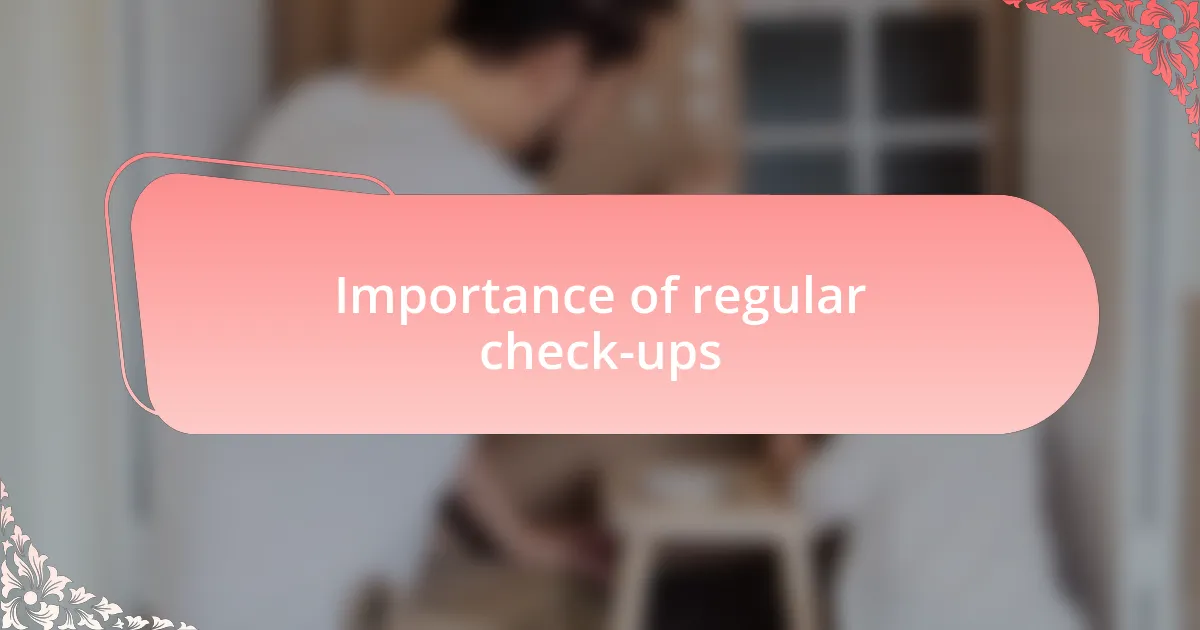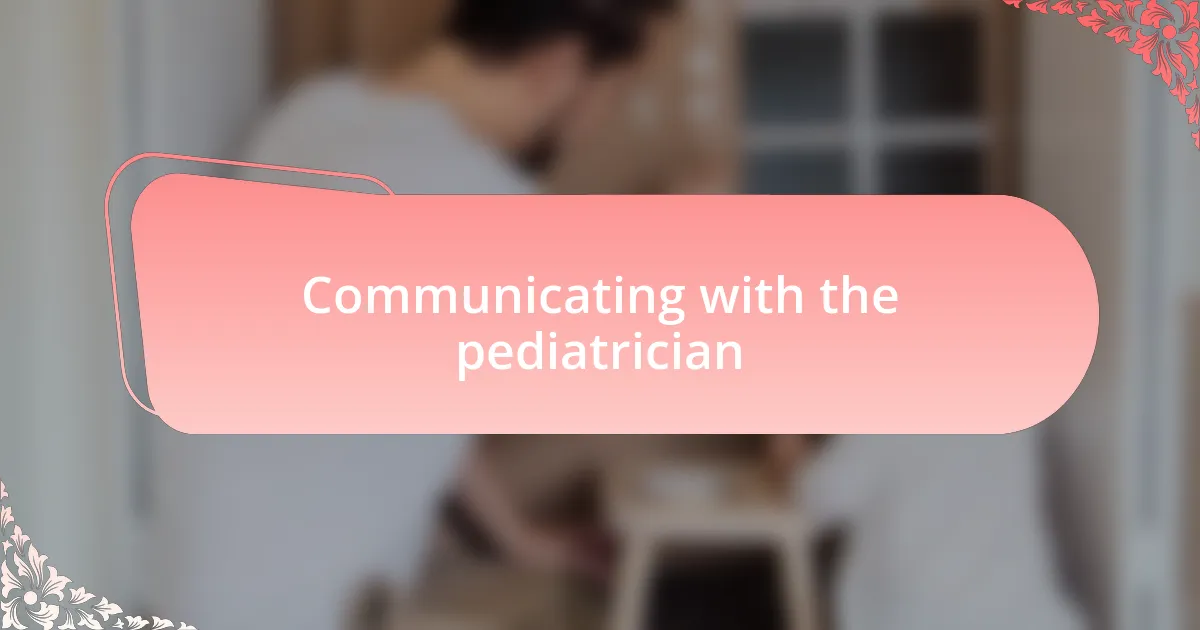Key takeaways:
- Pediatricians assess not only physical health but also emotional and behavioral aspects, highlighting the importance of well-rounded child development.
- Regular check-ups allow for early identification of health issues, promoting proactive care and open communication with the pediatrician.
- Effective communication involves being clear and direct, asking for clarifications, and documenting observations to support health discussions.
- Staying organized with follow-ups and referrals is crucial for managing your child’s healthcare journey efficiently.

Understanding pediatrician visits
Understanding pediatrician visits can feel overwhelming at times, which is perfectly natural for any parent. I remember my first visit with my daughter; I was filled with a mix of excitement and anxiety. Would the doctor be kind? Were all her milestones on track? That uncertainty is something many parents share, and it’s perfectly okay to have those feelings.
Pediatricians specialize in children’s health, which brings a unique focus on growth and development. During our visits, I’ve learned that these healthcare professionals not only assess physical health but also address emotional and behavioral issues. It’s fascinating how a simple check-up can reveal so much about a child’s overall well-being.
It’s crucial to prepare for these appointments. I’ve found that jotting down any questions or concerns can ease my mind and ensure that I don’t forget anything important. Have you ever left a doctor’s office wishing you had asked one more question? I certainly have. Taking that extra step always leads to a more productive conversation with the pediatrician.

Importance of regular check-ups
Regular check-ups play a pivotal role in a child’s health journey. I vividly remember my son’s first visit after his newborn screening; it was enlightening to see how his growth metrics and developmental milestones were tracked over time. Each appointment felt like a reassurance that we were on the right path, affirming my role as a parent.
These visits serve as a proactive approach to identifying issues before they escalate. During a routine check-up, I once learned that my daughter had a slight hearing issue that, if left unnoticed, could have affected her speech development. It made me realize just how essential these appointments are—avoiding problems before they become significant concerns requires routine care.
Additionally, regular check-ups provide an opportunity to foster open communication with your pediatrician. I find it comforting to discuss not just physical health but also any behavioral changes I’ve noticed in my kids. When was the last time you had a heart-to-heart with your child’s doctor? Those moments can greatly enhance our understanding of our children’s needs and promote a healthier environment at home.

Preparing for a pediatrician visit
Preparing for a pediatrician visit starts well ahead of time. I remember the nights before my children’s appointments, feeling a mix of excitement and anxiety. I would jot down any questions or concerns, because in the moment, I didn’t want to forget something important. Have you ever walked out of a doctor’s office thinking, “Oh, I should have asked about that”? Making a list can really help in ensuring that every concern is addressed.
Another essential step is to gather relevant documents, such as vaccination records or any notes from previous visits. Personally, creating a small folder has been a lifesaver for me. It not only keeps everything organized but also helps the doctor see the bigger picture of my child’s health journey. How often do we underestimate the importance of having this information at our fingertips?
Preparing your child for the visit can be equally important. I often found talking to my kids about what to expect calmed their nerves and mine. Simple explanations help alleviate fear. I would ask them, “What do you think the doctor will do?” Their imaginative responses often sparked lighthearted discussions, creating a more relaxed atmosphere leading up to the appointment. Isn’t it amazing how a little preparation can transform what might seem daunting into a positive experience?

Communicating with the pediatrician
Effective communication with the pediatrician can significantly shape your child’s health experience. I remember a time when I hesitated to express my concerns about my child’s unusual sleep patterns. Once I finally voiced my worries, the pediatrician provided simple yet impactful advice that directly addressed my fears. Have you found that speaking up about your worries often opens up new avenues of understanding?
During appointments, I learned the importance of being clear and direct. I used to overwhelm the pediatrician with too many thoughts at once. Now, I prioritize a few key points, presenting them one at a time. This not only keeps the conversation focused but allows for deeper discussions. Have you noticed how clarity can create more productive conversations in other areas of life, too?
Asking for clarification is also a key part of effective communication. If a medical term comes up that I don’t understand, I unashamedly ask for an explanation. It’s surprising how many parents hold back on questions out of embarrassment. I remember once asking about a diagnosis, and the doctor happily simplified everything, making me feel informed. Isn’t it reassuring to know that understanding your child’s health journey empowers both you and them?

Navigating health concerns effectively
When health concerns arise, having a game plan is crucial. I once faced a situation where my child developed a sudden rash. Instead of panicking, I gathered additional information—like when it appeared and any changes in diet—before our appointment. This proactive approach enabled the pediatrician to grasp the situation more comprehensively. Have you ever noticed how being prepared can transform the way health issues are addressed?
I also learned the value of documenting my observations. Keeping a health log has been invaluable for tracking symptoms and changes over time. It’s almost like having a health diary that I can present to the pediatrician, helping us both see patterns. Have you ever thought about how a simple record can provide clarity in complicated situations?
Lastly, fostering a collaborative relationship with the pediatrician can ease the tension of difficult conversations. After one particularly challenging visit, I realized that viewing the pediatrician as a partner rather than an authority made a significant difference. This mindset shift encouraged me to share my thoughts more freely. Isn’t it fascinating how collaboration can lead to better outcomes for your child’s health?

Managing follow-ups and referrals
Managing follow-ups and referrals can often feel overwhelming. I once received a referral for a specialist after a visit where my child’s issue needed further evaluation. Instead of letting the referral slip through the cracks, I made a follow-up call to ensure we secured an appointment promptly. Have you ever noticed how taking that extra step can turn a potentially confusing situation into something manageable?
I also keep an organized system for tracking follow-ups that works well for me. I write down each specialist’s information and upcoming appointments in a dedicated notebook. This simple habit ensures that nothing falls through the cracks. How often have you missed a crucial follow-up because it got lost in the shuffle? Trust me, staying organized can save you from a lot of unnecessary stress.
One tip that has helped me immensely is to communicate openly with my pediatrician. During our follow-up visits, I ask about the expected next steps and clarify any concerns about referrals. This dialogue gives me peace of mind and a clearer understanding of my child’s health journey. Have you ever considered how a simple question can open the door to more informed decisions?